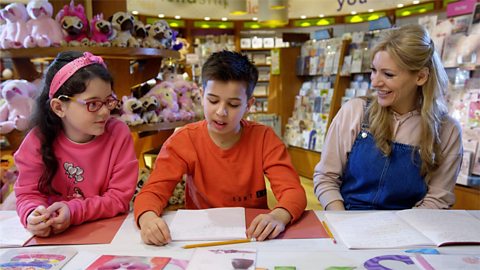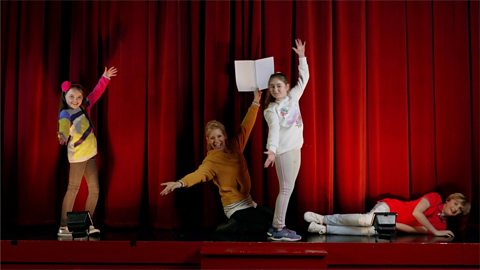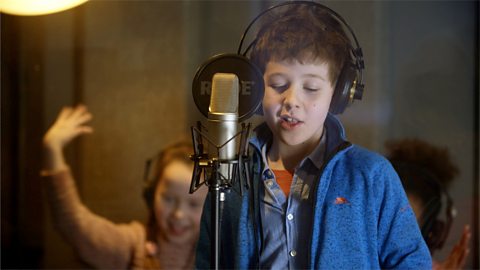Emine: The main headline todayâŠ
Florence: Children take over the C±«Óătv Newsround studio.
Emine: Welcome to the Newsround studio - We are here to present you with a new creative challenge.
Jenny: Erm⊠are you guys meant to be here?
Karim: Itâs alright Jenny, theyâre with me.
Jenny: Hi Karim, what are you guys up to?
Karim: We're doing a challenge to tell a storyâŠ
Frankie: CUT!
Jenny: What's it about?
Karim: Well, you donât want to hear it from me â lets hear it from the master.
Frankie: RUN VT! EVERYBODY CLEAR THE SET!
Karim: Meet the master, Shweta Aggarwal is an award winning children's author.
Shweta: Editing and revising your writing is one of the most important skills for any writer.
Shweta: Its not the most exciting part of the process, Iâll admit, but it makes such a difference to a finished piece.
Shweta: Sometimes when I am writing, I get on a roll and write whatever comes to mind,
Shweta: But my first draft is never my final draft.
Shweta: I'll always go back and make changes and adjustments. Broad vocabulary comes in very handy at this stage.
Shweta: A lot of the time there is a simpler and quicker way to say things without losing any of its sense.
Shweta: Take a look at this for example.
Shweta: Uh oh, said Ollie. Sorry, I mistook you for my friend Dev.
Shweta: What I originally had here was, Uh oh, I'm sorry, said Ollie. I thought you were my friend Dev.
Shweta: Your challenge is to write and present a 30 second news story behind the headline, âChildren take over the C±«Óătv Newsround studioâ.
Shweta: In your 30 seconds you are going to have to get across as much information as possible to your audience.
Shweta: So editing will be your Master Skill. And donât forget - you can be as creative as you like!
Karim: Wicked! We can be as creative as we like!
Karim: That means we can use our imaginations to make up a story for that headline and present it as a news report!
Karim: And what better place to do it than the Newsround news room.
Karim: Lets find out more about who's taking part.
Karim: We have Frankie. Who has some groovy dance moves.
Karim: Florence, who is a singing superstar.
Karim: And Emine, who's got a real artistic flare.
Karim: OK, lets get started! You will needâŠ
Karim: A pen or a pencil,
Karim: some paper,
Karim: a stopwatch or a timer.
Karim: Right team, are we ready to put the master skill to work and start your challenge?
Children: YEAH!
Karim: Let's get creating!
Karim: Remember, spoken sentences work best when you keep them short.
Karim: Don't be afraid to cut words out or change them around.
Karim: Editing will really help to improve your story.
Karim: Well these are looking so good guys! Really proud⊠hey!
Karim: Whilst we're here, should we get the Newsround team to record it for us like a real bulletin?
Children: Definitely!
Karim: If you have access to any recording equipment, like a tablet at school, why not record your classmates presenting their report too?
Frankie: This is Newsround, and dogs are taking over the world!
Emine: The giant rodent caused chaos as it ran wild through city streets!
Florence: For thousands of years, dinosaurs roamed the earth⊠I hope they're vegetarian!
Karim: Well if you enjoyed this creative challenge there are loads more on the ±«Óătv Teach website.
Karim: You can design a chair, write a song or even produce a stop-motion animation!
Karim: So go on, get creative!
Video summary
This short film presents a real-life context for telling a story and challenges children to tell a story as a short news report.
A group of children have taken over the Newsround studio.
With the help of Karim they will take on the challenge of telling a story as a short news report.
Our master storyteller â Shweta Aggarwal â will add to the challenge, by inviting them to incorporate the âmaster skillâ of editing and revising their writing.
The children use their imaginations to create a news worthy story, which they present at the end of the film.
This short film is from the ±«Óătv series, Get Creative.
Teacher Notes
Before Watching
Prepare for this challenge by asking your puipils to find/create/research a news story - it could come from a book youâre reading, a class visit, or a science/history/geography project.
It could be a real story they have researched themselves or one they have made up.
They could work on it for homework to bring to the lesson or it could come from previous work you have done together in class.
Choose a short clip from the Newsround website of a recent story that will engage your class.
Ask them to think about how this story was told by the presenter.
Discuss the skills and techniques the reporters use to tell their story (i.e. impact words, short sentences, summarising language).
Draw particular attention to the fact that spoken news is short and snappy in style.
You may want to create a class list of points, or have pupils note these down on whiteboards/jotters to use when they are writing their own stories.
After Watching
This activity could be done in groups, pairs or individually.
Set your students the challenge of writing short news reports (30 seconds) of their prepared stories.
Encourage the children to:
- Speak their stories aloud and to practise with a timer.
- Make the stories sound exciting.
- Give as much information as possible.
- Fit into the time restraint and sound natural.
You can use the Thinking Questions below to support this.
As an extra challenge invite children to include the âMaster Skillâ.
Master Skill
- Edit and revise your work â for sense, impact and timing.
Impress on children that no writer ever submits their first draft, there are always improvements to be made. Have them read their work aloud, to themselves or to each other, (if you have access to tablets, they could film or record themselves and watch/listen back), then edit for sense. Give them coloured pens and have them go through their writing, making changes to sentence structure for timing and word choices for impact. Draw attention to tense and point out how headlines are often written in the present tense.
You may want to include some modelling:
SENSE
Mister Men books could be harder than Roald Dahl.
- Mr Men books could be harder to read than Roald Dahlâs books.
TIMING
Plastics from products only used once then thrown away have been found present in 60% of the rubbish found in the River Thames.
- Single-use plastic found in 60% of River Thamesâ litter.
IMPACT
A pet cat showed how intelligent it was when it opened the bathroom door.
- Crafty cat manages to open bathroom door.
Thinking Questions
- What is it about your story that is going to interest the audience?
- What details are not important to the story?
- What high impact words can you use to get your point across?
- How can you improve your sentences?
- What tense should your story be in?
Supported Learning and SEN
As this challenge is about telling not writing a story, it is ideal for children who struggle with the written word. You can make this an entirely oral task if that is appropriate, or allow the presentation of the story to be the final product, with no need to submit the written version.
Depending on the needs of your students, you may want to adapt further. Here are a few ideas for how to support children and make this challenge even more accessible:
Creating / researching their story
- Choose an existing story from the C±«Óătv Newsround website or similar â i.e. a film/video of a news report.
- Create a story from something they have experienced directly.
Composing
- Have an adult/peer ask questions to help them remember their story.
- Have children represent their story with pictures to help them with recall.
- Consider shortening the task to one or two sentences.
Presenting
- Allow them to record one sentence or story point at a time on a tablet or film.
- If presenting live â consider presenting to smaller groups.
- Encourage the use of reminder cards â perhaps taken from the pictures they made of the story.
Extend this Activity
- Make a short news reel to add to the school website.
- Pick one story to extend and create a longer news feature for it.
- Write newspaper/online news reports for one or more of the stories.
- Use the story to kickstart a piece of fiction writing.
- Create a âhow toâ for writing news reports that can be shared on school website.
- Explore telling the story in a different context â i.e. to a group of nursery children, to a friend, as a police report.
- Make language choices to have an impact on audience.
- Adapt writing to purpose.
- Read work aloud and understand the difference between spoken and written language.
- Proofread and edit work, making revisions to improve compositions.
Curriculum Notes
This short film is designed to support the teaching of creative writing for KS2 in England, Wales, Northern Ireland and for 2nd level in Scotland.
In England the video offers pupils a chance to write with purpose in context, using the skills of notation and editing whilst also providing the opportunity to read work aloud and work towards mastery through developing specific key skills.
In Wales the video provides an opportunity for pupils to write creatively with chances to adapt their writing for purpose, use a range of language skills, note ideas and plan their writing then reflect, redraft and improve their work.
In Northern Ireland the video gives pupils the opportunity to participate in independent or group writing, select, plan and adapt their writing for purpose, express thoughts and feelings through their imaginative compositions, experiment with language and practise the skills of revising and redrafting their compositions.
In Scotland the video presents pupils with an example of contextual writing to explore, from which they can create their own pieces of writing from notes, use appropriate vocabulary, language and style to engage their reader and check their writing for sense and purpose.
Write a poem. video
In this short film for primary schools, Naomi Wilkinson and a group of children are challenged to write a poem for someone they know.

Write a script. video
Naomi Wilkinson challenges a group of children to write a short script for a TV show.

Write song lyrics. video
Karim Zeroual and a group of children take on the challenge of writing their own song lyrics.
